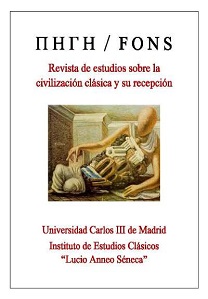Desarrollando un sentido de justicia
Aristóteles y John Rawls sobre el respeto razonado a la ley y los sistemas políticos estables
DOI:
https://doi.org/10.20318/fons.2021.5810Palabras clave:
sentido de la justicia, Aristóteles, John Rawls, principios constitucionalesResumen
En este artículo se presenta una caracterización conceptual de la idea de un “sentido de la justicia” como base motivacional adecuada para el respeto de los principios de justicia vigentes en una sociedad determinada. Además, se sostiene que una preocupación similar se puede encontrar no solo en Juan Rawls, quien expresamente habla de esa noción, sino también en Aristóteles. El argumento principal es que ambos pensadores invitan a los lectores a concebir el sentido de la justicia como una actitud que admite varios grados, que van desde el respeto a la ley inspirado por el miedo hasta la apreciación incondicional de los principios constitucionales establecidos y las leyes que de ellos emanan. En la primera parte de este artículo, se aborda la visión aristotélica de la actitud natural de los seres humanos hacia la sociabilidad, la participación política y la interdependencia funcional dentro de la ciudad, algo que culmina en una amistad política basada en la virtud. En la segunda parte, se argumenta que, a entender de Rawls, el sentido individual de la justicia se activa no solo después del establecimiento de una concepción pública de esa justicia (contrariamente a lo que podría sugerir una primera lectura de A Theory of Justice), sino también en una fase ante legem.
Descargas
Referencias
- Aristotle
Accattino, P. (1986), L’anatomia della città nella Politica di Aristotele, Torino.
Besso, G. and Curnis, M. (eds.) (2011), Aristotele. La Politica. Libro I, Roma.
Collins, S.D. (2006), Aristotle and the Rediscovery of Citizenship, Cambridge.
Cooper, J. (1990), «Political Animals and Civic Friendship», in G. Patzig (ed.), Aristoteles Politik: Akten des XI. Symposium Aristotelicum, Göttingen, 221-241.
Crisp, R. (ed. and trans.) (2000), Aristotle. Nicomachean Ethics, Cambridge.
Depew, D.J. (1995), «Humans and Other Political Animals in Aristotle’s History of Animals», Phronesis 40, 2, 156-181.
Garsten, B. (2013), «Deliberating and Acting Together», in M. Deslauriers and P. Destrée (eds.), The Cambridge Companion to Aristotle’s Politics, Cambridge, 324-349.
Kullmann, W. (1991), «Man as a Political Animal in Aristotle», in D. Keyt and F.D. Miller Jr (eds.), A Companion to Aristotle’s Politics, Oxford, 94-117.
Lord, C. (ed.) (2013), Aristotle’s Politics, 2nd edn. (first published 1984), Chicago.
Lockwood, T. (2020), «ὁµόνοια: The Hinge of Aristotle’s Ethics and Politics?», Dialogue 59, 1, 7-30.
MacIntyre, A. (1999), Dependent Rational Animals. Why Human Beings need the Virtues, Chicago.
Miller Jr, F.D. (1995), Nature, Justice and Rights in Aristotle’s Politics, Oxford.
Mulgan, R.G. (1974), «Aristotle’s Doctrine that Man is a Political Animal», Hermes 3, 438- 445.
Natali, C. (ed.) (2018), Aristotele. Etica Nicomachea (first published 1999), Roma-Bari.
Newman, W.L. (ed.) (1902), The Politics of Aristotle. Books III, IV and V, III, Oxford.
Regan, R.J. (ed.) (2007), Aquinas. Commentary on Aristotle’s Politics, Indianapolis-Cambridge.
Reeve, C.D.C. (ed.) (2014), Aristotle. Nicomachean Ethics. Indianapolis/Cambridge.
Ross, W.D. (ed.) (1957), Aristotle’s Politica, Oxford.
Rosler, A. (2005), Political Authority and Obligation in Aristotle, Oxford.
Saunders, Th. (ed.) (1995), Aristotle. Politics. Books I and II, Oxford.
Schofield, M. (1999), «Political Friendship and the Ideology of Reciprocity», in his Saving the City. Philosopher-Kings and other Classical Paradigms, London-New York, 72-87.
Schütrumpf, E. (ed.) (1991), Aristoteles. Politik: 1, Berlin.
Simpson, P.L.P. (ed.) (1998), A Philosophical Commentary on the Politics of Aristotle, Chapel Hill-London.
Yack, B. (1993), The Problems of a Political Animal: Community, Justice, and Conflict in Aristotelian Political Thought, Berkeley.
Zingano, M. (2019), «Aristotle on Justice and Punishment: A Reappraisal», in F. Masi, S. Maso, and C. Viano (eds.), Êthikê theôria: studi sull’ Etica Nicomachea in onore di Carlo Natali, Roma, 123-140.
- John Rawls
Baldwin, Th. (2008), «Rawls and Moral Psychology», in R. Schafer-Landau (ed.), Oxford Studies in Metaethics, New York, 247-270.
Freeman, S. (2002), «Congruence and the Good of Justice», in S. Freeman (ed.), The Cambridge Companion to Rawls, Cambridge, 277-315.
Greenawalt, K. (1985), «The Natural Duty to Obey the Law», The Michigan Law Review Association 84, 1, 1-62.
Klosko, G. (1994), «Rawls’ Argument for Political Stability», Columbia Law Review 94, 1882-1897.
Kukathas, Ch. (2003), The Liberal Archipelago: A Theory of Diversity and Freedom: Oxford.
Laden, A.S. (2014), «Constructivism as Rhetoric», in J. Mandle and D.A. Reidy (eds.), A Companion to Rawls, Oxford, 59-72.
Mandle, J. (2014), «The Choice from the Original Position», in J. Mandle and D.A. Reidy (eds.), A Companion to Rawls, Oxford, 128-143.
Rawls, J. (1963), «The Sense of Justice», The Philosophical Review, 72, 3, 281-305, Repr. in S. Freeman (ed.) (1999), John Rawls. Collected Papers, Cambridge (MA)-London, 96- 116.
Rawls, J. (1993), Political Liberalism, New York.
Rawls, J. (1999), A Theory of Justice. Revised Edition (first pub. 1971), Cambridge (MA).
Sangiovanni, A. (2015), «Solidarity as Joint Action», Journal of Applied Philosophy 32, 4, 340-359.
Testino, C. (2012), Ragioni Pubbliche e Giustificazione, Genova.
Descargas
Publicado
Número
Sección
Licencia
Se permite que los autores de los artículos y de las discusiones publicados en la revista los reproduzcan en otros sitios siempre y cuando se haga mención de que han sido previamente publicados en ΠΗΓΗ/FONS.
